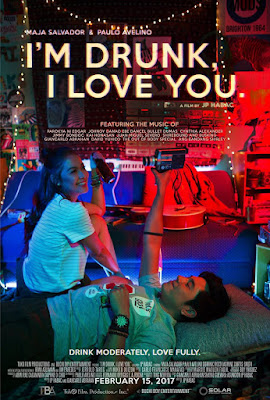BENDOR (Ralston Jover, 2013)
BENDOR opens inside an abortion clinic, where Blondie (Vivian Velez) reveals to her abortionist friend (Evelyn Vargas) about how she caught her womanizing husband, and how that resulted to an awkward and humorous encounter. The conversation is casual, until a woman screams in the other room. It is a patient- a young woman, and her condition does not look good.
We then see Blondie's usual day: by breakfast, having to deal with the problems brought about by her grown-up children; then there's her good-for-nothing husband; by midday, she has to man her stalls in Quiapo, and; on occasion, she sells the prohibited abortifacient Cytotec discreetly.
Today, Blondie's whole life will unravel in front of her. Premonitions will save her from a tragic fate. Almost.
BENDOR, a film that highlights the matriarchal role in present society shows us through Blondie how crippled we would be if not for the mother of our homes. In this aspect, Ralston Jover gets my sympathy in presenting that a mother will more often than not, find solutions to alleviate her family's day-to-day disasters, even at the expense of her own happiness.
However, since the film is entitled BENDOR (vendor), I am inclined to at least analyze on the surface how the character/s of the vendor/s gets portrayed. Moreso that the vendor characters in this film are Quiapo vendors, one of the most recognized figures in cinema, and even in documentaries. There have been more portrayal of Quiapo vendors on film and on the boob tube than the number of your fingers and toes that any more addition to the lot has to be scrutinized on a) why them again? and b) what's new?
On why them again, BENDOR categorically answers the question. The illegal sale of Cytotec (which you cannot buy in any respectable drugstore in the country, FYI because it is banned by our Food and Drug Administration) has become so associated with Quiapo, and the transactions occur, ironically in front of a Catholic Church.
On what's new, the film presents very little to none. However I did appreciate several elements of metaphor, such as when a woman goes to Blondie's stall to light candles in prayer for her husband (who is probably also a womanizing fool), and the irony could not be any thicker, because all the while Blondie is besieged by the unfair toll her husband has imposed on her existence and well-being.
Several scenes could have been shortened. That roundup scene in the police station could have been edited out and the film would still stand.
A lot of great actors were put in roles that did not maximize their caliber. Sue Prado looked like the doormat daughter, and Evelyn Vargas was too generic to stand out as a memorable abortionist. That's ironic, for a film that highlights motherhood.
Nevertheless, Vivian Velez took the weight of her role with enough restraint that we feel for her character. We care what happens to her, simply because she's been through much and she's still suffering, and any minute she is ready to break, but she doesn't. Her gloomy facade expresses many hard truths.
BENDOR has a lot of potential to become a compelling sociorealist drama that will actually make us realize something magnanimous about our society; instead it has chosen the path to center on one woman's futile resistance to her sad reality, and while there's nothing really wrong about it, the film therefore has veered away from the juxtaposition of a Quiapo vendor, an abortionist, and a mother, the three main human representations of the film, of which Blondie is every single one.
RATING: 2/5


Comments
Post a Comment